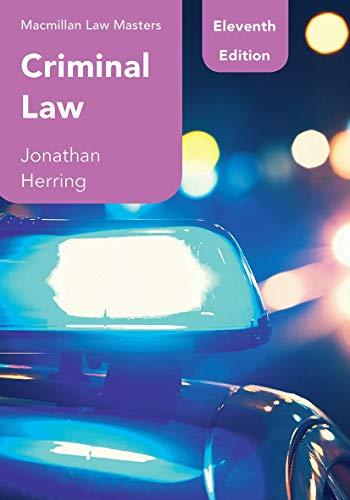Question
1. (a) On March 25, 2020, Kartik calls the Orissa Co-operative Society for a loan. On April 1, 2020, he is approved for a loan
1.(a) On March 25, 2020, Kartik calls the Orissa Co-operative Society for a loan. On April 1, 2020, he is approved for a loan of Rs.50,000, which is payable in 1 year @10% interest per annum. On June 20, 2020 he again approaches the Society, this time for a loan of Rs.80,000. The Society decides to give him the loan at 50% interest per annum, payable in a year's time. Kartik is furious at this rate of interest being charged from him for the second loan. Since he doesn't have time and needs the money urgently for his business, he says yes to it. Later, he takes Orissa Co-operative Society to court. Kartik also suffers from severe anxiety and paranoia. While he is okay most of the time, stressful times sometimes induces him to have panic attacks. This can be corroborated by a number of doctors and therapists he goes to. He claims that since he is a mental health patient, the enormous amount of interest being charged by the Society is very stressful to him. On 25th September, 2020, he sues the Orissa Co-operative Society in court and wants to get out of the second loan contract for Rs.80,000. Does he have a cause of action?
(b) On July 15, 2020, Kartik had presented a cheque for Rs.20,000 to the Orissa Co-operative Society in lieu of his first loan for Rs. 50,000. However, the cheque bounced, and the Society takes him to court for dishonour of cheque under section 138 of the Negotiable Instruments Act, 1881. However, Kartik argues in court that he can't be sued under section 138 of the Negotiable Instruments Act because the Act only applied to banks, and a Co-operative Society was not technically a bank. Further, he also claims that he is not a regular customer of the bank. In fact, due to the Corona virus pandemic, he had not even set foot in the Society, and had simply had a brief 10 minutes conversation with a loan approving officer. His relationship with the Society, he claimed, was composed of a single transaction which lasted 10 mins. To be considered a customer, he must have a long standing relationship with the Society. Since he was not a customer, and as claimed earlier, this was not a 'bank', the action could not be maintainable under the Negotiable Instruments Act. Are Kartik's claims legally sound?
(c) Kartik had a younger brother, Vishnu. As per a previous contract made previously between Kartik and his late father, Kartik was given complete charge of his father's business, for providing a monthly allowance of Rs. 20,000 to his younger brother in return for the next 10 years. Given Kartik's current case against the Orissa Co-operative Society and a faltering business, he stops paying the monthly allowance to Vishnu. Vishnu is in dire need of the money and sees no other option but to sue Kartik for the money. However, Vishnu's lawyer tells him that since he was not an original party to the contract, he can't sue Kartik. Is his lawyer correct?
Step by Step Solution
There are 3 Steps involved in it
Step: 1

Get Instant Access to Expert-Tailored Solutions
See step-by-step solutions with expert insights and AI powered tools for academic success
Step: 2

Step: 3

Ace Your Homework with AI
Get the answers you need in no time with our AI-driven, step-by-step assistance
Get Started


